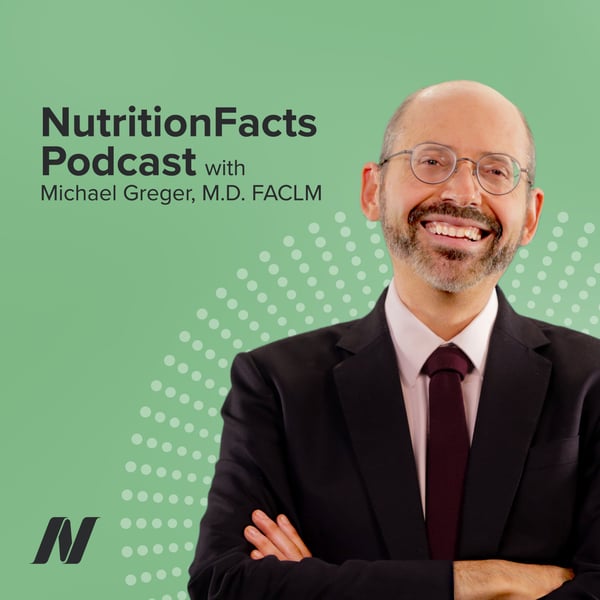Beating Prostate Cancer
Nutrition Facts with Dr. Greger
[email protected]
4.8 • 3.6K Ratings
🗓️ 1 August 2024
⏱️ 16 minutes
🧾️ Download transcript
Summary
* The Pros and Cons of Testing PSA Levels for Prostate Cancer
* Changing a Man’s Diet After a Prostate Cancer Diagnosis
* Natural Dietary Treatments for Enlarged Prostate BPH
Visit the video pages for all sources and doctor's notes related to this podcast.
Transcript
Click on a timestamp to play from that location
| 0:00.0 | Did you ever wonder if certain foods have a direct effect on your health? |
| 0:05.0 | Well, I'm here to solve that mystery since you are the foods you eat. |
| 0:10.0 | Welcome to the Nutrition Facts Podcast. I'm your host Dr Michael Greger. |
| 0:15.0 | Today we bring you new research about prostate cancer and we start with the |
| 0:20.0 | sometimes problematic results of PSA testing. |
| 0:24.0 | While 64% of men develop hidden prostate cancers by their 60s, |
| 0:29.0 | the lifetime risk of being diagnosed with prostate cancer is only about 11%. And the risk of dying from prostate cancer 2.5% at the average age of 80. So most men develop prostate cancer, but they die with their tumors rather than from their tumors. Most |
| 0:47.2 | men with prostate cancer live their whole lives never knowing they even had it. That's one of the problems screaming for it. Many prostate |
| 0:55.6 | cancers that are detected may never have led to harm even if they gone |
| 1:00.5 | undiscovered. Nonetheless, not all men are so lucky. About 30,000 Americans |
| 1:06.6 | die each year from prostate cancer. So should you get a PSA prostate screening test or not? |
| 1:14.7 | PSA stands for prostate-specific antigen and enzymes secreted by cells of the prostate |
| 1:20.7 | to liquefy semen and cervical mucus to facilitate fertilization, elevated levels in the blood can be a sign of prostate cancer, which led to FDA approval as a screening test for the early detection of prostate cancer in the 1990s. If it comes back high, |
| 1:36.4 | the test is usually repeated. If it's still high, the next step is typically an ultrasound |
| 1:41.6 | guided biopsy of the prostate through the rectum. |
| 1:44.4 | If there's cancer, then options include surgery, radiation, and chemotherapy or a |
| 1:51.0 | delayal of treatment. However, the USPSTF, the U.S. Preventive Services Task Force, the main independent scientific |
| 1:59.9 | panel that sets evidence-based clinical prevention guidelines recommended against routine |
| 2:06.5 | PSA screening, as does the American College of Prevent Medicine, the American Academy of Family |
| 2:12.3 | Physicians, and the vast majority, 85% of professional |
| 2:16.4 | medical societies in developed countries around the world opposed. |
| 2:21.2 | In 2018, though, the USPSTF shifted from a summary judgment against two, quote, |
... |
Please login to see the full transcript.
Disclaimer: The podcast and artwork embedded on this page are from [email protected], and are the property of its owner and not affiliated with or endorsed by Tapesearch.
Generated transcripts are the property of [email protected] and are distributed freely under the Fair Use doctrine. Transcripts generated by Tapesearch are not guaranteed to be accurate.
Copyright © Tapesearch 2025.

